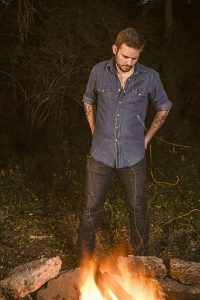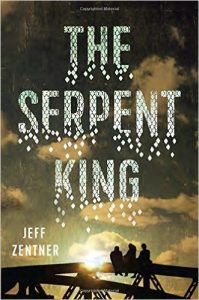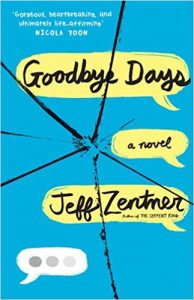 An interview with Jeff Zentner, winner of the 2016 AML Young Adult Novel Award for his debut novel, The Serpent King. Jeff’s book shares the stories of three teenagers living in a small town in Tennessee who each, in their own way, look for escape from the constraints they see limiting them. It’s been widely praised in numerous starred reviews and was also awarded the American Library Association’s William C. Morris Award for a debut YA novel. He came to writing books for young adults after a career in music, and his second book, Goodbye Days, was published earlier this year. His website (jeffzentnerbooks.com) has more on his books, hosts some of his music, and features one of the better FAQs on the Internet. Jeff is also an Assistant Attorney General for the State of Tennessee.
An interview with Jeff Zentner, winner of the 2016 AML Young Adult Novel Award for his debut novel, The Serpent King. Jeff’s book shares the stories of three teenagers living in a small town in Tennessee who each, in their own way, look for escape from the constraints they see limiting them. It’s been widely praised in numerous starred reviews and was also awarded the American Library Association’s William C. Morris Award for a debut YA novel. He came to writing books for young adults after a career in music, and his second book, Goodbye Days, was published earlier this year. His website (jeffzentnerbooks.com) has more on his books, hosts some of his music, and features one of the better FAQs on the Internet. Jeff is also an Assistant Attorney General for the State of Tennessee.
The interview was conducted by Jon Ostenson, an assistant professor in English Education at Brigham Young University.
Can you tell us more about what inspired the writing of The Serpent King? Why this book, this setting, these characters?
 I wrote The Serpent King as I was transitioning over from being a musician. I based the concept of the book on two songs that I had written, that I thought had more of a story to them than I had told in the original songs. I chose this setting and these characters because they had been in my head for a long time, producing songs without my knowing it.
I wrote The Serpent King as I was transitioning over from being a musician. I based the concept of the book on two songs that I had written, that I thought had more of a story to them than I had told in the original songs. I chose this setting and these characters because they had been in my head for a long time, producing songs without my knowing it.
You made a significant choice in this book to have the story presented in three different viewpoints (rather than a single, first-person narrator). What were the pros and cons that you weighed in making this decision?
It was challenging to write in this way because the name of the game in YA is immediacy, and nothing is more immediate than first person, present tense. So I knew I was taking a risk. Fortunately, books about rural, poor, Southern scions of snakehandling dynasties do gangbusters in the YA space (joke). What weighed on this decision was that I wanted to achieve a certain tone and voice to the book–a sort of mythic, lyrical feel, like a modern-day fairy tale. The best way to achieve this was with the distance of third-person past tense viewpoint.
Why did you want a mythic tone for this book?
I love it when stories imbue non-mythical places like small-town rural Tennessee with a mythical quality. There’s a certain dignity and weight that we assign to stories with such a quality, but it’s sort of arbitrary how we’ve decided what sort of stories are allowed to have that quality.
I wanted to write a story that felt like a superhero origin story, but where the superhero is a talented, thoughtful, beaten-down kid.
What was it like writing about a young man struggling with issues of faith/belief, especially knowing that you’re writing for a younger audience? Did you censor yourself or worry about the audience or their reactions as you wrote?
What’s funny is that I was so new to the YA world when I wrote it, I had no idea what topics had been dealt with in depth in the YA space. I just assumed that many, many books had dealt with struggles of faith/belief. I later came to find that that was not the case. For the most part, I don’t censor myself on the substance of my book. I did try to limit profanity and other content to the equivalent of a PG-13 rating, because it’s important to me that librarians in conservative areas not put themselves in professional danger by recommending my book to kids who struggle with faith, of which there are many in conservative places.
As a person of faith, do you feel any kind of obligation to explore issues of faith or religious belief in your work?
I wouldn’t phrase it so much as a social obligation, but an obligation born of who I am as a person. Faith has been a big part of my life, for better or worse. It’s hard to separate myself entirely from who I am when I write. So matters of faith will naturally creep in. That is, matters of faith have crept in. I’m currently writing a book where faith and religion play little or no role, so I might have successfully dealt with some things in my first two books. We’ll see if that sticks.
Why do you think it is that books for young adults tend to skirt issues of religion/faith? Have you experienced any push-back or challenge to this aspect of your book?
I really don’t know why that is, especially because so many readers of YA come from backgrounds of faith. I’ve heard from people who are angry because my book has too much religion in it and from people who are angry because they think I’m too hard on religion, so I take that as a sign I’m doing something right.
 How do you create characters that act and think and speak like authentic teenagers, especially when each character is unique?
How do you create characters that act and think and speak like authentic teenagers, especially when each character is unique?
I’m fortunate as a YA writer in that I have a very good emotional memory of youth. This is a curse and a blessing. But it makes it easy for me to put myself in the mindset of the audience I write for. As for creating authentic teen speech, I cheat a bit in that I make no attempt to reproduce teen slang. I believe this to be a fool’s errand because teen slang is impenetrable to adults, by design, and by the time adults become fluent in it, they’ve moved on (precisely because adults are fluent in it). Instead, I remember how much I loved to speak with energy, vigor, and intelligence as a teen. I loved conversations that meant something, that had real emotional stakes. That had humor and sharp wit. So I try to write dialogue with energy, wit, intelligence, and stakes. Also, I believe that teenagers have the essential intelligence of an adult by teenagerdom. They may lack certain types of experiential intelligence, but the fundamentals are there. So I remember and honor that as well.
In addition to the award-winning The Serpent King, you’ve just released a second young adult book that’s earning some strong reviews, too. Why did you decide to focus on writing young adult fiction?
As my music career came to end, I started volunteering at a rock camp for teenagers called Tennessee Teen Rock Camp and another one called Southern Girls Rock Camp. From this experience, I learned that I love teenagers. I love their curiosity and hunger to experience life. I love the way they love the art they love unabashedly and deeply. I wanted to create for that audience, but I knew I was well past the age of plausibly making the sort of music that gets marketed to young adults. So I did what I could. If juggling had been my only way to reach that audience, I would be a juggler.
What connection do you see between your work as a songwriter and as an author of YA novels?
In both fields, I’m most interested in working in a tonal and emotional register. I seek a feeling above all else. I’m untrained in both and do both by ear and instinct. My processes in writing books and music are similar in the sense that I’m at my best when my mind is in quiet and meditative places that allow me to get “transmissions” and “revelation.” I’m best able to access that place by going on walks. One important difference between the two, though, is writing books definitely requires way more discipline and commitment. In a song, you don’t need stakes or an arc. The protagonist of a song can be sad at the beginning of a song and sad at the end of a song. They don’t need to change or grow. That makes books more challenging in a way.
Could you share with us one of your favorite reader responses to the book?
Just hours ago, I was at my favorite used bookstore, and I saw my book on the shelf. This is exciting to me rather than demoralizing, because I hope my book can be someone’s discovered treasure, the way so many used books have been for me. Anyway, while I was browsing, I heard two young women saying “I’ve heard this is good” and “I hear the author lives in Tennessee.” They were holding my book. So I walked up and said “Yes, he does. I wrote that.” We all freaked out a little bit. It was really fun.
A big “thank you” to Jeff and Jon for conducting this interview.

I love Serpent King. We’re reading it for my month of book club next year. It’s my favorite book from last year, and just a gem.
I’d love to hear more about Jeff Zentner’s personal faith journey, as it relates to Serpent King and just in general. He seems fairly private about that, which is fine, but if he ever wants to speak up he has an audience.